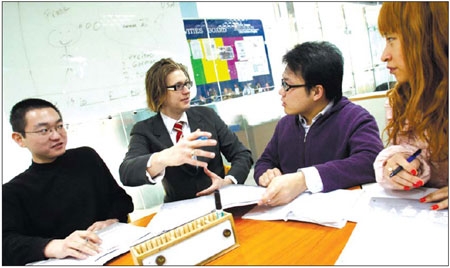Lingua franca
Updated: 2011-02-25 10:14
By Patrick Whiteley and Xiao Xiangyi (China Daily European Weekly)
|
 A United English class in Beijing. More than 10,000 students have passed through the school. Zhang Wei / China Daily
|
McKenzie was previously a hotel manager, and had no teaching experience, but later discovered a passion for the work. He has since gone through tertiary studies and is now a qualified teacher and operates his own school in Beijing.
"But I don't think you need to be a qualified teacher to teach English. You need passion and dedication," he says. "Unfortunately, a lot of foreign English teachers in China are here for an adventure or are just traveling through on a holiday and don't take the job seriously."
McKenzie says many English language schools just "use foreign faces to make money" and do not train their teachers well.
"Millions of Chinese have the potential to become proficient in English but students must take studying English more seriously than they do," he says.
"It all depends on the way students study. Right now when they study English they are not learning it for real-life situations and using it in daily life."
Joe Christian, who has been teaching English in China for six years, sees major problems in the test-orientated education system.
"The biggest problem for me as a teacher is how I deal with students who for most of their lives have memorized a language for a test rather than actually trying to use that language to communicate," says the American, who teaches at Beijing Foreign Studies University.
"The common thought is English can help you to get ahead in life, but the way in which they are going about learning English does little to help them beyond the test that helps them get ahead.
"That's why you have incredibly smart PhD level people that have studied English for years, have passed high level English tests and can read Shakespeare but can't hold a discussion about it."
Li Yang, founder of Crazy English, which is one of the best-known English language institutes in China, calls for major educational reforms.
"School education in China is examination-orientated and students lack creativity and this is very pitiful," he says. "Most students spend over a decade of learning English and yet they still cannot speak it out, so we need education reforms."
Mary Clark, a qualified high school teacher from Scotland who now teaches at Beanstalk International School in Beijing, says Chinese children are also under huge pressure from their parents.
"The students are forced to put in huge hours. Even their weekends are filled with extra homework and classes," she says. "I've had students who are so tired that they regularly fall asleep with their heads on the desk."
E-paper

Online shops boom in China
Low investment, quick returns offer profit-making opportunities for struggling students.
Something 'fishy' about this trick
Banking on success
Branded outlets move in
Specials

The green lantern
Environmental concerns are shedding new light on a colorful tradition

Inland interchange
Chongqing bets on its position as a hub for China's west.

Zooming in on Chinese skies
Helicopter companies ride on country's growing interest in luxury aviation.
